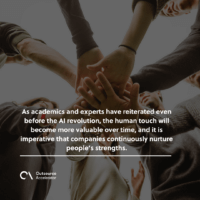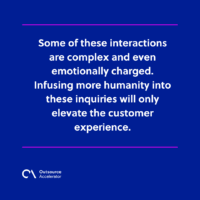‘Are you human?’
More and more customer service agents are being mistaken for artificial intelligence (AI), which has significant implications for how call centers should conduct their core operations.
At the beginning of a call, customers bluntly ask the call center agent if they’re human or not. The agents giggle, cough, or do vocal tics just to prove they’re real, living, and breathing humans. Once these awkward verification processes are done, they proceed to recite the client-approved scripts, which unfortunately provokes their customers to either yell at them or hang up.
This trend has added a new type of work burden. Agents now have to prove their humanity before they can do the actual work. Before AI, they could easily build trust and confidence in their customers. They could then proceed with the necessary steps to fulfill the customer’s requests, as a bond has been established.
Deep in the AI revolution, customers are slowly losing trust in the service segment. Companies have been too enamored by AI’s promises of low cost and high efficiency to the point that they’ve set aside providing customers with A-class service. This could prove detrimental to their business if they continue to tread this path.
Empowering humans
Their incessant and awkward verification steps demonstrate that human agents are still preferred in a world that is increasingly leaning towards AI. As academics and experts have reiterated even before the AI revolution, the human touch will become more valuable over time, and it is imperative that companies continuously nurture people’s strengths.
For call centers, this means giving agents more leeway to deviate from scripted responses. Although conversations between agents and customers follow certain protocols, they should still have a semblance of spontaneity. Agents must be encouraged to utter personalized responses to foster better rapport with their customers. Some of these interactions are complex and even emotionally charged. Infusing more humanity into these inquiries will only elevate the customer experience.
The Klarna case
Swedish tech company Klarna’s experience is a good case study that we can all learn from. It once boasted that its AI engine could do the work of 700 full-time agents. Not long after this proclamation, it ditched its bots, citing a multitude of errors and the fact that its customers still prefer the human touch.
To address this need and correct its mistakes, Klara launched an outsourcing initiative that utilizes human agents who can work anywhere in the world. Its CEO went on to declare: “Really investing in the quality of the human support is the way of the future for us.”
Klarna learned the value of human contributions to their operations. It courageously admitted its mistakes and enforced the proper directives to align with customer needs. Firms, especially those that have invested millions of dollars in AI, should not be afraid to acknowledge their bots’ shortcomings. Instead of pushing for something that still doesn’t work seamlessly, why not invest in human capital, which has consistently been an intrinsic part of business success over the years.
The question for your business
How do your human employees add unique ‘human’ value to their work?
Read more thought leadership articles here:




 Independent
Independent





















